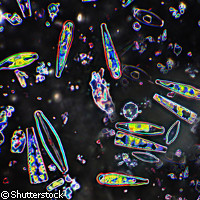Research shows diatomic ability to process silicon
A study partially funded by the European Union has, for the first time, measured the ability of diatoms to transport and metabolise silica. The findings will help to shed light on the role of this group of algae in our ocean's biogeochemical cycles. Diatomic algae also produce nearly 25% of the oxygen in the Earth's atmosphere, which is nearly the same level as produced by tropical forests. Publishing in the open-access journal Public Library of Science (PLoS) One, the team of scientists led by Pascal Jean Lopez from French National Centre for Research (CNRS) looked at the mechanisms which control the formation of the glass-like extracellular skeletons of diatoms. Until now, the processes involved in how the organisms assimilate, store and transport silicon have remained little understood. The study was in part supported by the MARGENES ('Marine phytoplankton as novel model organisms for genomic and post-genomic studies of environmental sensing and niche adaptation') project under the Fifth Framework Programme (FP5) as well as by the Sixth Framework Programme (FP6) project DIATOMICS ('Understanding diatom biology by functional genomics approaches') and the Marine Genomics ('Implementation of high-throughput genomic approaches to investigate the functioning of marine ecosystems and the biology of marine organisms') Network of Excellence. The study focused on a species of diatom called Phaeodactylum tricornutum and its synthesis of silicon. Study results showed that a grouping of certain genes must have been favoured during the evolution of diatoms. This arrangement may enable a better optimisation of responses to variable environmental stimuli. Genes were identified that were likely to be implicated in the storage and metabolism of silicon, as well as certain types of gene regulation responsible for silicon transport. Researchers also found that the ability to adapt to varying levels of silicon in marine environments may arise in part due to global regulations from gene to genome levels and by post-transcriptional regulation and spatial distribution of proteins. While silicon is essential to the growth of many species of diatoms, Phaeodactylum tricornutum does not require it to survive. This particular species of algae lives in several locations around the world, typically in coastal areas with wide fluctuations in salinity. Phaeodactylum tricornutum is also the first pennate diatom for which complete genome information is available. Researchers wanted to know if the diatom, given its unique properties, would still seek to assimilate silicon. Diatom cells are contained within a unique silicate cell wall. The biogenic silica constituting the cell wall is synthesised intracellularly by the polymerisation of silicic acid monomers. This material is then extruded to the cell exterior and added to the wall. Decomposition and decay of diatoms leads to the transformation of these silicates in the resulting sediment. Further research will enable a clearer understanding of glass chemistry and the anticipation of certain environmental modifications linked to the silicon and carbon cycles. While the MARGENES project studied the potential of diatoms and cyanobacteria as scientific model organisms, the DIATOMICS project specifically looked at marine diatoms and such issues as carbon sequestration, nutrient acquisition, the rise and fall of algal blooms and biofouling. Marine Genomics joins together scientists, policymakers, businesses and other stakeholders and is dedicated to developing high-throughput approaches for the investigation of the biology of marine organisms.
Countries
France



